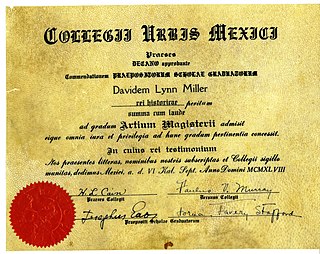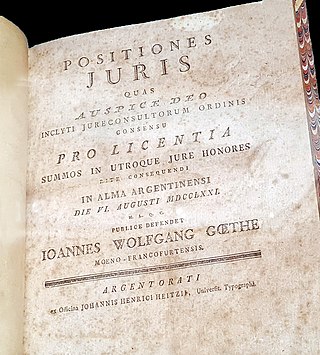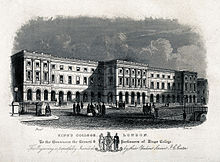
King's College London is a public research university located in London, England. King's was established by royal charter in 1829 under the patronage of King George IV and the Duke of Wellington. In 1836, King's became one of the two founding colleges of the University of London. It is one of the oldest university-level institutions in England. In the late 20th century, King's grew through a series of mergers, including with Queen Elizabeth College and Chelsea College of Science and Technology, the Institute of Psychiatry, the United Medical and Dental Schools of Guy's and St Thomas' Hospitals and the Florence Nightingale School of Nursing and Midwifery.
A bachelor's degree or baccalaureate is an undergraduate degree awarded by colleges and universities upon completion of a course of study lasting three to six years. The two most common bachelor's degrees are the Bachelor of Arts (BA) and the Bachelor of Science. In some institutions and educational systems, certain bachelor's degrees can only be taken as graduate or postgraduate educations after a first degree has been completed, although more commonly the successful completion of a bachelor's degree is a prerequisite for further courses such as a master's or a doctorate.
Bachelor of Civil Law is the name of various degrees in law conferred by English-language universities. The BCL originated as a postgraduate degree in the universities of Oxford and Cambridge; at Oxford, the BCL continues to be the primary postgraduate taught course in law. It is also taught as an undergraduate degree in other countries. The reference to civil law was not originally in contradistinction to common law, but to canon law, although it is true that common law was not taught in the civil law faculties in either university until at least the second half of the 18th century. However, some universities in English-speaking countries use the degree in the former sense.
An associate degree or associate's degree is an undergraduate degree awarded after a course of post-secondary study lasting two to three years. It is a level of academic qualification above a high school diploma and below a bachelor's degree.

A diploma is a document awarded by an educational institution testifying the recipient has graduated by successfully completing their courses of studies. Historically, it has also referred to a charter or official document of diplomacy.
The system of academic degrees at the University of Oxford can be confusing. This is not merely because many degree titles date from the Middle Ages, but also because many changes have been haphazardly introduced in recent years. For example, the (medieval) BD, BM, BCL, etc. are postgraduate degrees, while the (modern) MPhys, MEng, etc. are integrated master's degrees, requiring three years of undergraduate study before the postgraduate year.
A postgraduate diploma is a postgraduate qualification awarded after a university degree, which supplements the original degree and awards them with a graduate diploma. Countries that award postgraduate diplomas include but are not limited to Bangladesh, Barbados, Belgium, Brazil, Canada, Chile, Colombia, Germany, Hong Kong, Jamaica, Spain, Kenya, South Africa, Sudan, India, Israel, Ireland, the Netherlands, New Zealand, Nigeria, Republic of Panama the Philippines, Portugal, Russia, Pakistan, Poland, Saudi Arabia, Singapore, Sweden, the United Kingdom, Sri Lanka, Trinidad and Tobago and Zimbabwe. Level of education and recognition differ per issuing country.
A Doctor of Pharmacy is a professional doctorate in pharmacy. In some countries, it is a doctoral degree to practice the profession of pharmacy or to become a clinical pharmacist. In many countries, people with their Doctor of Pharmacy are allowed to practice independently and can prescribe drugs directly to patients. A PharmD program has significant experiential and/or clinical education components in introductory and advanced levels for the safe and effective use of drugs. Experiential education prepares graduates to be practice-ready, as they already have spent a significant amount of time training in areas of direct patient care and research.

A licentiate is an academic degree present in many countries, representing different educational levels. It may be similar to a master's degree when issued by pontifical universities and other universities in Europe, Latin America, and Syria.
In Western universities, a Bachelor of Divinity or Baccalaureate in Divinity is a postgraduate academic degree awarded for a course taken in the study of divinity or related disciplines, such as theology or, rarely, religious studies.
A Diplom is an academic degree in the German-speaking countries Germany, Austria, and Switzerland and a similarly named degree in some other European countries including Albania, Bulgaria, Belarus, Bosnia and Herzegovina, Croatia, Estonia, Finland, Poland, Russia, and Ukraine and only for engineers in France, Greece, Hungary, North Macedonia, Romania, Serbia, Slovenia, and Brazil.
The Licentiate in Theology or Licence in Theology is a non-degree qualification in theology awarded in Canada and previously awarded in the United Kingdom, Australia, and New Zealand.

Indian Institute of Technology Madras is a public technical university located in Chennai, Tamil Nadu, India. It is one of the eight public Institutes of Eminence of India. As one of the Indian Institutes of Technology (IITs), IIT Madras is also recognized as an Institute of National Importance.
A professional degree, formerly known in the US as a first professional degree, is a degree that prepares someone to work in a particular profession, practice, or industry sector often meeting the academic requirements for licensure or accreditation. Professional degrees may be either graduate or undergraduate entry, depending on the profession concerned and the country, and may be classified as bachelor's, master's, or doctoral degrees. For a variety of reasons, professional degrees may bear the name of a different level of qualification from their classification in qualifications, e.g., some UK professional degrees are named bachelor's but are at master's level, while some Australian and Canadian professional degrees have the name "doctor" but are classified as master's or bachelor's degrees.

The University of Cambridge Institute of Continuing Education (ICE) is a department of the University of Cambridge dedicated to providing continuing education programmes which allow students to obtain University of Cambridge qualifications at undergraduate and postgraduate level. Its award-bearing programmes range from undergraduate certificates through to part-time master's degrees. ICE is the oldest continuing education department in the United Kingdom.
Philip John Hesketh is an Anglican clergyman.

The Department of Philosophy is an academic division in the Faculty of Arts and Humanities at King's College London. It is one of the largest and most distinguished centres for the study of philosophy in the United Kingdom.

The Department of Classics is an academic division in the Faculty of Arts and Humanities at King's College London. It is one of the oldest and most distinguished university departments specialising in the study of classical antiquity in the United Kingdom.

King's Business School (KBS) is the business school of King's College London located in London, the United Kingdom and is a constituent academic faculty of the university. King's College London was ranked 5th in the United Kingdom in The Complete University Guide (2023) and 12th in The Guardian's Business, Management & Marketing league table (2022). KBS is triple accredited by the AACSB, EQUIS, and AMBA.

Keith Graham Riglin was an Anglican bishop in the Scottish Episcopal Church. Having ministered from 1983 within Baptist and Reformed churches, he took holy orders in the Church of England in 2008. In January 2021 he was elected Bishop of Argyll and The Isles and held that post until his death.












